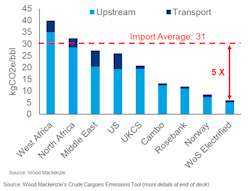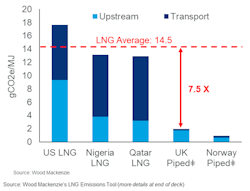Blocking West of Shetland oil projects counter-productive in terms of emissions
Offshore staff
LONDON — Development of the deepwater Rosebank and Cambo oil fields west of Shetland would be far less emissions intensive for the UK than importing the equivalent volumes of oil and gas, according to Wood Mackenzie.
Although Equinor is thought to be advancing its proposal for the Rosebank project, environmental lobby groups are heavily opposed to Cambo. Shell recently withdrew from this project, with operator Ithaca Energy struggling to secure finance for the development.
However, Malcolm Forbes-Cable, vice president of Energy Consulting (Upstream, EMEA) with Wood Mackenzie, said the two projects would save the UK 17 MM metric tons in CO2 emissions over their projected life spans compared to importing the equivalent volumes of oil and gas.
During his presentation at the recent DEVEX conference in Aberdeen, he added that the two projects could bring £40 billion of gross value add (GVA) to the UK economy and create 900 long-term jobs.
“The UK plays a critical role in the integrated European energy market, and these developments would seek to reduce the need for the UK to import carbon-intensive alternatives," he said. "From an economic perspective, the business case for the development of these two fields is compelling, and there is the added benefit of the additional energy security it would bring to the UK.”
According to Wood Mackenzie’s Emissions Benchmarking tool, UK oil and gas production typically generates materially lower emissions than imports, and the added emissions from imports would be 500% more than from hydrocarbons from an electrified Rosebank and Cambo.
“With final investment decisions looming, both Rosebank and Cambo act as barometers for the future of oil and gas production in the UK North Sea,” Forbes-Cable said. “If neither of these fields go to full development, it will be difficult to make a clear economic case for fields with less potential.”
Sir Keir Starmer, leader of the opposition Labour Party, has stated that Labour would issue no further licenses for exploration in the North Sea if it wins the UK’s next election, as is widely expected.
In an interview with the BBC, Ithaca Energy’s executive chairman Gilad Myerson commented, “By a new government imagining they’ll be able to stop licenses and oil development in the UK, ultimately what that means is that they’ll be starving the UK of energy, and it will become very dependent on energy from abroad."
"Politicians keep making statements, which spook investors,” he added. “You have to make sure that the environment is stable because this is a project that will last for 10 years.”
The Energy Profits Levy, which the Conservative administration introduced last year and then raised further, will remain until 2028 unless oil and gas prices fall for a sustained period.
“The taxation regime is changing constantly,” Myerson continued, “and it’s very difficult to invest huge amounts of capital when you don’t know what type of return you’ll be getting.”
06.27.2023



